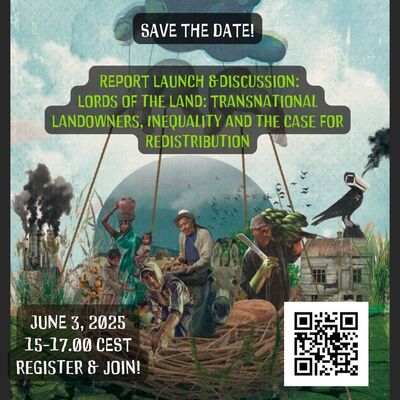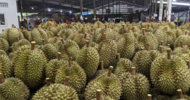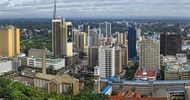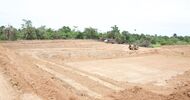The real threat to our food security, according to researchers, is broader corporate ownership and consolidation of American farmland — including by domestic investors.
Farmers in the El Gezira and El Managil Agricultural Scheme are considering forming a union to address land issues, seven years after the Farmers Union was disbanded by the Al Bashir regime in Sudan.
Research by Sarawak Report has revealed unreported ownership by the Sultan of Selangor of a key company behind the state’s hugely controversial decision to de-gazette a swathe of protected forest at Kuala Langat.
- Sarawak Report
-
01 September 2021
Members of the Auyu tribe of Papua, Indonesia, are demanding a halt to the operations of palm oil company PT Indo Asiana Lestari (IAL), which appears to be gearing up to clear their ancestral forests. IAL’s concession is part of the Tanah Merah megaproject that is already dogged by allegations that key operating permits have been falsified.
The IMF is said to be making the passage of a law to privatise farmland a condition for emergency assistance to Ukraine to help it cope with the coronavirus pandemic.
Little of the 5 million acres [2.02 million hectares] that Sudan's agriculture ministry estimates are in foreign hands—perhaps less than 1 in 20 acres—has been cultivated.
A state-owned plantation company, PTPN XIV, is evicting farmers to make room for an oil palm estate on the eastern Indonesian island of Sulawesi. The case is one of thousands of land disputes simmering across Indonesia.
The Atama plantation may never happen, but that uncertainty hasn’t prevented investors from potentially making a profit by clearing native forests and ruining ideal gorilla and chimpanzee habitat.
- Mongabay
-
05 February 2016
Plight of Kenya's indigenous Sengwer shows carbon offsets are empowering corporate recolonisation of the South
A controversial foreign investment to produce agrofuels for Europe on 20,000 ha in Senegal has angered communities and sparked violent clashes between peasants and the police.
- CRAFS, GRAIN, Re:Common
-
07 November 2013
A move by the Indonesian government to buy one million hectares of land for beef production in Australia for its own local market has reignited the foreign ownership debate.
Background note to accompany a joint press release on the Kenyan government finding Karuturi Global Ltd guilty of tax evasion
Small farmers lose livelihoods as 'controversial' palm-oil producing multinational moves in. Much of rural Liberia's population lives on land that has been in the family for generations.
Indonesian President Susilo Bambang Yudhoyono is scheduled to inaugurate the food estate on Feb. 12-13.
- Jakarta Globe
-
03 February 2010
The 450 civil society organisations taking part in a parallel forum were not won over by FAO's optimism about a code of conduct. "Land grabbing by external capital must stop," read a declaration by participants at the forum.
Area nearly the size of France purchased, leased for food production around the world Africa, South America, parts of Europe targeted by cash-rich, food-poor nations
- Circle of Blue
-
17 November 2009
An internal document recently posted on IRRI's website reveals that the Institute has been advising Saudi Arabia in the context of its strategy to acquire farm land overseas for its own food production.
As other countries have pushed their industrial bases thousands of miles offshore in search of resources and labor, China is doing the same thing with agriculture, expanding as far away as Africa in its effort to feed its people.
- Asia Sentinel
-
01 August 2008
Haishan Group, a private Beijing-based construction firm with farming operations in Angola, has announced its involvement in the construction of a 300-hectare real estate and fishery industrial park featuring aquaculture, seafood processing, and feed production facilities.
- Seafood Source
-
18 Mar 2024
Swedfund, the Swedish development investment company, has invested tens of millions in a company that will produce ethanol in Sierra Leone, but the local people affected by water shortages and hunger when the company took over their land. Now the inhabitants urge Sweden for help.
- Sveriges Radio
-
02 May 2012
More than $9 billion of prized agricultural assets have been sold to offshore interests in the past two years alone.
- Daily Telegraph
-
15 November 2010
"It's not something that is going to take too long, it's not rocket science," Angel Gurria, secretary-general of the OECD, said of the planned guidelines on agriculture.
Mr Murray, spokesman for the Maori trust buying farms for foreign investors, told the Southland Times website he would buy the whole South Island if he could.
- Southland Times
-
19 December 2009
Plantations et Huileries du Congo, the DRC’s leading palm oil producer, plans to exponentially increase its palm oil production, but this strategy could exacerbate land conflicts.
We must recognize and stop the growing takeover of forest, grassland, and farmland by powerful financial actors, which is being perpetrated in the name of new myths of false solutions to climate change.
- ActionAid USA
-
23 November 2024
On May 7, 2024, Lipton announced the sale of its Kenyan tea estates to LOLC Holdings PLC. The tea estates are on land that was violently seized from the Kipsigis and Talai clans by the British army in the early 20th century.
- Business & Human Rights
-
24 June 2024
A new report has found that investors and agribusiness in Latin America are increasingly buying up small parcels of land with abundant water access, thus securing control over the vital resource.
Possible plans to develop large-scale agriculture in Suriname have sparked backlash from Indigenous communities and others who are concerned about deforestation of the Amazon and the fate of ancestral territories.
After a delay of almost five years to the day, the Roundtable on Sustainable Palm Oil (RSPO) has finally got around to addressing a complaint filed against a company linked to clearing Papuan rainforests.
Forests in Cambodia have seen large-scale deforestation with rubber and cassava plantations, illegal logging and other economic interests, but despite the criminalisation, communities are fighting back
















